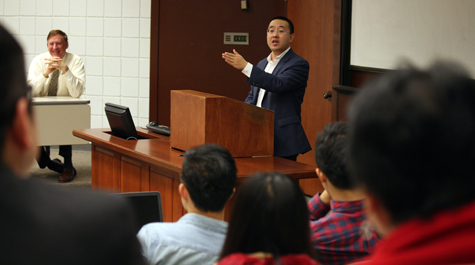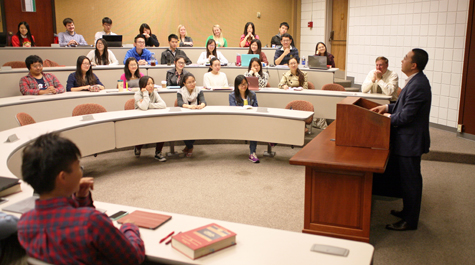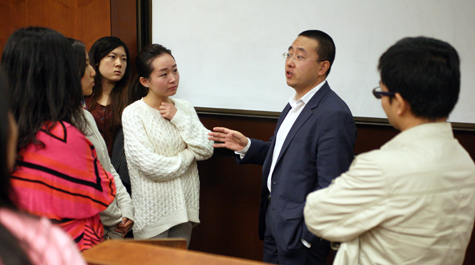LL.M. Alumnus Bridges Cultures with Law
On Friday, Nov. 8, Shang Dai visited the Law School to share the story of his career, a story of how determination and perseverance can lead to success. Dai is a 2003 graduate of the Law School’s LL.M. program and went on to found Dai & Associates, the largest Chinese-American law firm in New York.
Dai began his journey like all other LL.M. students: he studied law in his native country, earning his Bachelor of Laws degree from Nankai University in Tianjin, China. He learned that legal education is far different in China than in the U.S.
“In China as students we didn’t learn a lot about what happens in reality, in society, how the law applies to the cases, just the law itself,” he says. “Here you learn how the law applies and how it has evolved.”
After graduation, Dai began work with CSCEC, the largest state-owned construction company in China. This job posed many challenges for a young lawyer, and he admits having to start from zero to learn everything from construction policies to government orders.
After two years, Dai felt a need to advance his skills and education, and decided to pursue legal studies in the U.S. He was accepted in various LL.M. programs, but chose William & Mary because he felt it was important that LL.M. students take the same classes as first-year students, instead of specialized seminars like programs at other U.S. laws schools.
He was also drawn to William & Mary’s history. “I learned the history of this law school…it’s very deep in the law,” he says. “Also, I felt like the area, Virginia, was the origin of the United States.”
Dai was one of only eight students in the program at the time, and found the language barrier a challenge when navigating the curriculum. He surmounted this challenge, though, and after graduation moved to New York to seek employment. Things did not go smoothly at first. “At the beginning…it was very difficult for me to find a job, and I failed my first bar examination. It was very harsh,” Dai recalls.
He was unemployed for half a year, and remembers sometimes walking to save money on subway fares. But this period brought its own positive lessons. “I was under huge pressure. I learned how to adjust [myself] and how to become mentally, emotionally strong.”
Dai passed the bar on the second attempt and found a job in a small firm, which gave him an opportunity to show his ability to others. “I quickly built up a clientele and reputation in the Chinese community, mostly because I was very diligent. I would finish a lot of work overnight. I worked very hard.”
Dai focused on real estate law and civil litigation representing the Chinese community. Over the course of his work, he perceived a real need in the legal market. “I noticed there was a big gap between the big firms in Manhattan and the small firms in Chinatown,” he says. “When Chinese companies came over here, they only had two options: pay a lot of fees without getting the service they need, or go to a small firm that doesn’t have the capacity to handle [their case].”
Dai sought to fill this need, and opened his own firm, Dai & Associates. He says this was risky, because there weren’t as many cross-border transactions in 2005. “But I saw the trend,” he says. “I took on an adventure at the time.”
Years later, Dai reflects on his success and looks forward to the future. “We’re in the front position with cross-border transactions… We still have a lot of growth and development we need to do.” The firm hopes to open branch offices to expand their business nationwide.
Dai still works with Chinese state-owned companies as well as private companies trying to move into U.S. markets. Such business across borders brings its own set of challenges.
“The biggest barrier I experience is not the language, but the culture,” Dai notes. “A lot of deals didn’t go through, not because the deal itself was not good enough or the acquisition parties didn’t agree, but because culture caused a lot of misunderstanding during communication.”
Well-versed in both Chinese and American business cultures, Dai’s firm serves as intermediary to pass on intentions and desires to ensure smooth communication. “We’re trying to be creative,” he says. “If you only followed the common practice here, you’d have to say ‘no’ to some foreign investors, but if you only follow the foreign investors’ requests, you’ll offend a lot of local clients here.”
During his visit to William & Mary, Dai spoke with this year’s LL.M. class about the challenges and opportunities their degrees will offer them. He recalled a Chinese proverb which states that success has three elements: timing, location, and relation. The LL.M. students now have perfect timing, Dai said, as they are beginning their legal careers in a time of increasing globalization, where knowledge of other languages and cultures will be in demand.
He encouraged each student to conduct a thorough self-evaluation of strengths and weaknesses, saying, “You need to find out how you can differentiate yourself from others, what is the value you can add to a team, to a firm, to a society.”
Most of all, he emphasized the importance of persistence and determination. In tough times, Dai says, “Life will give you hope…as long as you can hang on.”
About William & Mary Law School
Thomas Jefferson founded William & Mary Law School in 1779 to train leaders for the new nation. Now in its third century, America's oldest law school continues its historic mission of educating citizen lawyers who are prepared both to lead and to serve.





